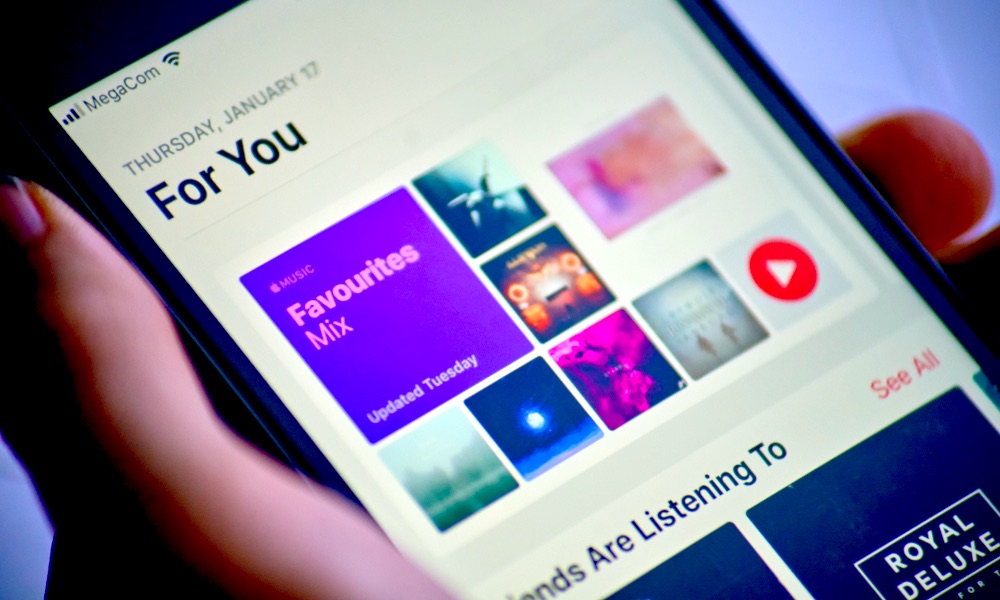Here’s Why Apple Music Will Never Offer a Free Tier
 Credit: Konstantin Savusia / Shutterstock
Credit: Konstantin Savusia / Shutterstock
Toggle Dark Mode
From the very first day it was launched back in 2015, one of the big things that differentiated Apple Music from its competition was the fact that it was solely a paid service. While rivals like Spotify offer up their music for free, making their premium subscriptions an option, Apple clearly wanted everyone to know that Apple Music was a premium service, period.
While that’s led many to chalk up Apple’s decision to simple greed, there’s actually a lot more to this, as Apple Music’s global director of Music Publishing recently explained to members of a U.K. parliamentary committee.
Last fall, the U.K. government launched an inquiry to determine whether services like Spotify and Apple Music were compensating musicians fairly for their work, however as with most such inquiries, these things move at the speed of government, and as a result, it’s taken until now for the actual streaming service executives to be called to the table to speak with the U.K. government’s Digital, Culture, Media and Sport (DCMS) Committee.
During the proceedings, which were reported on my Music Ally, Elena Segal, who heads up global music publishing for Apple, explained why Apple Music doesn’t offer a free tier, and why it likely never will — and it’s about far more than money, at least more than lining Apple’s own pockets.
Instead, Segal notes, Apple is concerned about supporting artists, or as she puts it, supporting a “healthy overall ecosystem.” Although the free tiers offered by Spotify and Amazon attract more users and generate revenue through ads, these don’t generally equate to nearly as much money in the pockets of artists and music publishers.
I think more people would probably be using Apple Music [if it were free]. It wouldn’t change our service. We don’t think that an ad-supported service can generate enough revenue to support a healthy overall ecosystem. And it would also really go against our fundamental values on privacy.
Elena Segal, Apple’s Global Senior Director of Music Publishing
Further, Segal notes that Apple doesn’t really see any way that it could opt for an ad-supported business model without somehow compromising its values on privacy, since advertising networks, by their very nature, require a level of tracking that goes beyond what Apple is comfortable doing to its users.
It may surprise you to know that right now, Apple doesn’t actually track what you listen to on Apple Music for managing royalties. While there has been much debate in the industry about moving to a “user-centric” payout model, that’s not what Apple or even Spotify are doing right now. Instead, they simply allocate royalties based on overall number of streams, regardless of what individual users listen to.
Segal concedes that it’s “always very difficult” to compete with free services, but also says that’s nothing new, adding that iTunes has been competing with free services of various kinds since it debuted back in 2003.
Although much of the competition back then was with illegitimate services that offered up pirated music, Segal notes that hasn’t really changed today in light of services like YouTube that effectively offer an “all-you-can-eat” buffet of music.
Even those legitimate services like YouTube create an un-level playing field, since they pay licensing fees in fundamentally different ways.
They don’t necessarily have licences for all the music that they use, and they don’t need to. And even if they do have licences, the amount they pay because of the way their business model is set up, and the way the tariffs work, is less.
Elena Segal, Apple’s Global Senior Director of Music Publishing
In fact, the questions posed to Segal and her counterparts from Spotify and Amazon often centred around YouTube and its role in the streaming music game; the other two were asked pointedly whether they would even offer a free tier if YouTube didn’t exist (they said they would).
The committee also asked several other pointed questions concerning the economics of how royalties are split between music labels, publishers, songwriters, and the artists themselves, and Segal was quick to point out that Apple continues to ensure that publishers get their fair share, noting that it negotiates all the details separately.
We’ve never gone, ‘Hey labels, how much do you want?’ and whatever’s left goes to the publishers. From our point, publishing is just as important. We negotiate them separately… We’re generally negotiating with completely different people.
Elena Segal, Apple’s Global Senior Director of Music Publishing
This would seem to be borne out by the fact that Apple has been paying out a record amount of royalties to music publishers, and has often been praised by songwriters as being a friend to the music publishing industry, particularly after it avoided getting embroiled in an attempt by Spotify and others to oppose an increase in royalties paid to songwriters.
While it’s clear that Apple Music will never offer a free tier, it’s hard to argue that while the economics of streaming services can be quite complicated, this is generally a good thing for both musicians and users overall.






